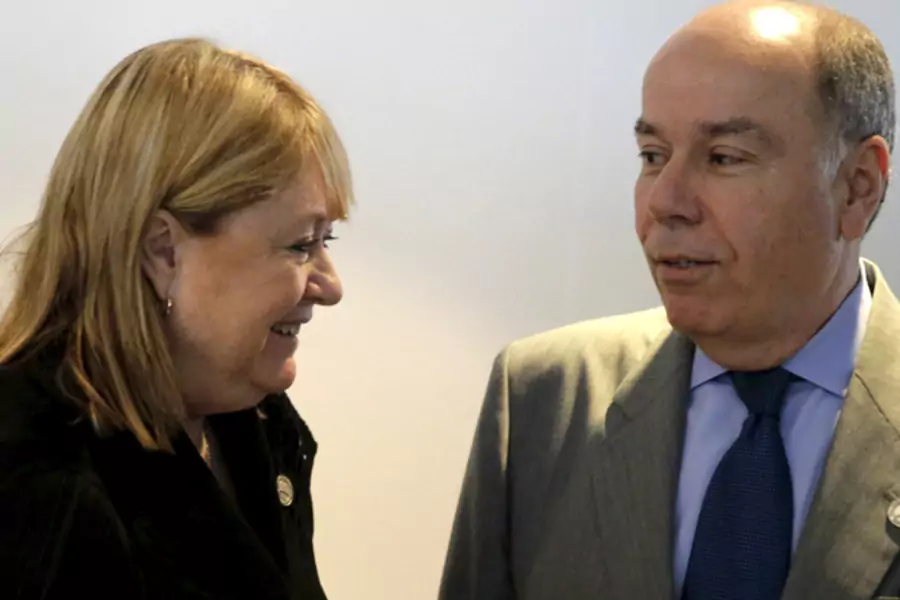South America’s Shifting Diplomatic Landscape

More on:
The past year has altered Latin America’s diplomatic panorama. Among the most significant changes were a U.S. policy turnaround that included U.S. rapprochement with Cuba, a reset in U.S.-Brazil relations cemented during President Dilma Rousseff’s June state visit to Washington, DC, and greater U.S. participation in the Colombian peace talks. In addition to these carefully strategized advances, a variety of far more contingent factors is converging in ways that are likely to shake up established regional alignments within South America. As the region prepares for the fourth Community of Latin American and Caribbean States (CELAC) summit at the end of January, the rightward shift of domestic politics in the region, the woeful state of Brazil’s Rousseff government, and the Pacific turn in trade negotiations are combining in ways that may create a new set of opportunities for regional relations, and will certainly jumble the status quo.
The Chinese slowdown, the end of the commodities boom, the decline in oil prices, and the failure to undertake deep reforms that would improve long-term economic and political prospects have triggered a shift in domestic politics across the region. As various sharp analyses have noted recently, this probably spells the end of a long period of extraordinary political stability that has endured for fifteen years in countries as varied as Argentina, Bolivia, Brazil, Chile, Colombia, Ecuador, Uruguay and Venezuela.
In two of these countries, Argentina and Venezuela, noisy change came at the end of last year. The replacement of the Kirchner dynasty by President Mauricio Macri has already led to a substantial shift in economic policy rhetoric. This may be the leading edge of a regional move away from profligacy; as Marta Lagos cleverly noted, there is no populism without money. But the continued popularity of the Kirchner policy mix and the minority status of Macri’s coalition suggests that some of his more ambitious domestic reforms will have limited legislative support. Macri’s limited scope of action at home, combined with a Rousseff government desperate to escape its domestic troubles, might provide an opportunity for a long-overdue reckoning on Mercosur’s political and economic objectives. The symbolic importance of Mauro Vieira’s visit to Buenos Aires in mid-January was hard to miss: the Brazilian became the first foreign minister to meet with his counterpart Susana Malcorra and discuss the two countries’ shared “bilateral, regional, and multilateral” agenda.
Simultaneously, there has been a subtle shift in the regional attitude toward the reddest of the so-called “pink tide countries” that had governed much of South America since the turn of the century. The legislative victory of the opposition coalition Democratic Unity Roundtable (MUD) in Venezuela’s December elections triggered the first regional crisis of 2015, and the showdown between the opposition-led National Assembly and the Chavista-friendly supreme court has been the central focus of foreign ministries across the region for much of the past month. Predictably, both the Organization of American States (OAS) and the United States expressed concern about the Venezuelan supreme court’s decision voiding elections in the state of Amazonas and declaring National Assembly legislation null until the contested legislators were removed from office. More surprising, perhaps, was the Brazilian government’s decision to express its confidence that “the constitutional prerogatives of the new National Assembly” would be preserved, a signal to President Maduro’s government that there were limits to Brazilian tolerance for extra-constitutional meddling.
Brazil’s rotten prospects for the year ahead—Brazilians joked that when they said “Happy New Year!” on January 1, they were actually referring to 2017—contributes to the regional window of opportunity. Rousseff’s first five years in office were foreign policy averse: she eschewed the globetrotting of the Lula years, even as the country’s BRICS partners stumbled. Gone are the days of a Brazilian quest for a UN Security Council seat, or a comprehensive Doha Round negotiation led by a Brazilian World Trade Organization (WTO) president. In their place is a petty spat with Israel that has sputtered on since mid-2014, now focused on what is, to many Brazilians who follow global affairs, the indigestible nomination of a prominent settler in the occupied territories as Israel’s ambassador to Brasília.
Meanwhile, the current corruption scandals and the related crisis of state capitalism in Brazil have undermined the country’s regionalized foreign policy, founded on Mercosur and Unasur as counterweights to U.S. influence in the hemisphere. And there is precious little clarity in Brasília these days about where the country should focus its foreign policy. But desperation might be a source of invention. Already, the scramble to find new sources of investment that might make up for the credit-strapped public banks, like the National Economic and Social Development Bank (BNDES) and Banco do Brasil, or to restore the capacity for public infrastructure spending, has led Brazil to new ventures, such as the $20 billion Brazil-China Fund. The crisis seems likely to prize open foreign investment opportunities as well, as state owned enterprises are forced to abandon their prior emphasis on national preferences in a desperate search for partners.
Finally, the regional realignment is being driven by the shock imposed by the Trans-Pacific Partnership (TPP). While TPP seems very unlikely to move to ratification during President Obama’s final year in office, the shock of the “Pacific” countries’ turn to Asia—via TPP or the Pacific Alliance—has led to cries of desperation in many “Atlantic” countries who see themselves being left behind. In sum, although declining oil prices, lower commodity prices, and negative growth have diminished the ambitions expressed at the turn of the century, they have refocused South American foreign policy discourse in a realistic and potentially productive new direction.
More on:
 Online Store
Online Store